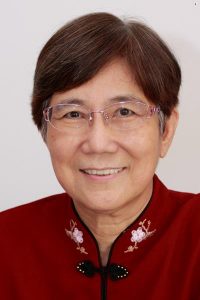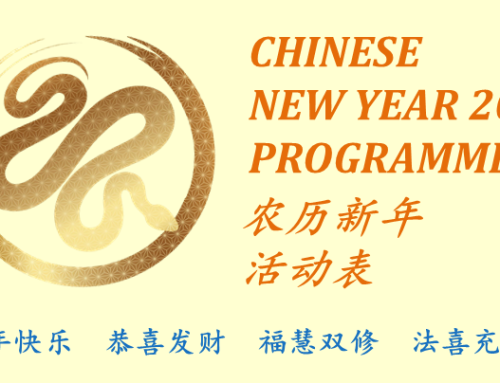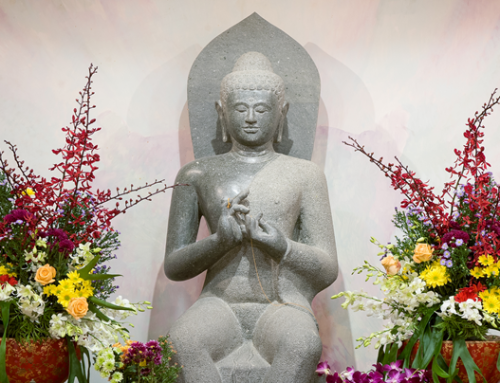Date: 3 Dec 2017 (Sun)
Time: 4.00pm to 5.30pm
Venue: The Buddhist Library, Level 2 Auditorium
Fees: FOC, All are Welcome
About Dr. Ang Beng Choo

Dr. Ang Beng Choo was a prominent educator with the Ministry of Education for 33 years. Among her contributions, she was instrumental in transforming the instructional materials compilation and teaching pedagogy of Chinese language in Singapore during her time.
After retirement, she has frequently been invited to give talks on personal development, marriage and family education. In addition, she also devotes her time in performing marriage solemnization as a volunteer deputy registrar of marriage. .
Dr. Ang was recommended by the Singapore Chinese Teachers’ Union (SCTU) to the National Library Board (NLB) for memory interview as part of the Singapore Memory Project. In this interview, Dr. Ang shared with us about her childhood memories, growing up in Singapore and her journey in the education sector. She also imparted her insights on teaching and the issues faced by youths today.
Dr. Ang Beng Choo was born in Singapore in the 1940s. Both her parents were immigrants from China, and they settled in the Telok Ayer area, where they stayed on the second storey of a shophouse. A shophouse then consisted of three levels, providing accommodation for multiple families, usually a family on each level. Dr. Ang recalled that there was a strong ‘Kampong’ spirit among neighbours in the area; the adults knew each other while the children played in a group. Although Dr. Ang was the only child in the family, she never felt lonely because of her company of childhood friends in the neighbourhood. The children were very active and moved in and out of houses to play. Some of her close friends frequented her house to eat because her grandmother cooked very well. Children also went to school together in the vicinity. Most boys went to Ai Tong School, and girls to Chong Fu Girls’ School.
Education during that time was very traditional and teachers were highly respected. Parents gave teachers full trust in educating their children. When classes first began, some parents would even bring canes to teachers for disciplining their children. On their part, teachers would occasionally do home visits to understand about the family background of pupils and their lives outside school better. Dr. Ang believes that this partnership between parents and teachers was effective in giving children a good upbringing in their formative years.
After completing her secondary education at Nan Chiau Girl’s High School, Dr. Ang entered University of Singapore (now National University of Singapore) in 1961. However, at that time, her family encountered financial difficulties due to Konfrontasi, or the Indonesian-Malaysia Confrontation. Thus, Dr. Ang had to take a government bursary to complete her university education. Unknowingly, this turn of events would eventually set her on an illustrious journey in the education sector.
After graduating with an Honours degree in Chinese Language and Literature, Dr Ang began her teaching career at Dunman Integrated School which housed both English and Chinese streams under one roof. She was assigned to teach Chinese language and literature, History, Chinese and English translation in both language streams. At the start, her parents reminded her to put students’ benefits above all. She also loved teaching very much and took initiatives, for instance, amending mistakes in textbooks on her own. Some of her students were not interested in learning. Some, she recalled, were even involved in triad gangs. Unfazed, she shared with her students stories of great men to build up their confidence and advised them that mistakes in the past were bygones, and encouraged them to do their best. Gradually, a good rapport developed between her and her students. As a result, the students improved tremendously in their studies. She fondly remembered two incidents in the second year of her teaching. One was that all her students did well in the year-end examination on the subjects she taught, a big surprise to her principal and colleagues. Her students were even asked to re-sit the tests to ascertain no leakage of examination papers. The other was about a gold pendant which she always wore. One morning, it was robbed along a small lane near the school. Her students noticed its missing and asked her about it. One of her students got it back for her in the very afternoon. She concluded that if you developed a good rapport with your students, they would study hard for you and protect you from harm.
From her experiences, Dr. Ang believes that the best teaching methodologies are based on strong student-teacher relationship. Regardless of which teaching methods used, students will put in an extra effort in their studies if they respect and love their teachers. To achieve that, Dr. Ang recommends the use of praise and encouragement on students’ strengths and achievements to build up their confidence as everyone appreciates a pat on the back.
After teaching for about three years, Dr. Ang was posted to the Ministry of Education (MOE) as an Assistant Specialist Inspector for Chinese Language and Literature. Shortly after, she was awarded the East-West Centre Grant for Masters’ education in the University of Hawaii. She did a research on the Chinese language instructional materials and teaching methods with the objective of identifying their short-comings and possible rectifications. Upon returning in Singapore, she requested to lecture at Teachers’ Training College (now National Institute of Education) to put her research to practice.
Two years later, she was posted back to MOE headquarters to develop and implement new instructional materials and teaching methods for Chinese language at primary school levels. The project was well received by 27 schools at the pilot stage. After some interruptions due to policy changes in between, the project was fully implemented across all primary schools in Singapore in the early 1980.
Thereafter, Dr Ang was given the responsibilities to be the overall in-charge for the development of instructional packages for mother tongue languages (Chinese, Malay and Tamil) and Moral Education at primary and secondary levels as well as Religious Knowledge Studies at secondary levels. To encourage her staff in learning each other’s language and culture, she took up the challenge of using the respective mother tongue language to give opening speeches at various mother tongue language teachers’ workshops. Until today, her former colleagues still fondly remember her as a Chinese wearing Punjabi suit eating Malay food at the office canteen.
To pursue her research interest in language instructional material compilation and teaching methodology, she went on to obtain a PhD in Applied Linguistics (Language Planning and Implementation) with the National University of Singapore. Her thesis has served as a record on the theory and implementation of Chinese language teaching in Singapore and has been a resource for subsequent researchers in this area.
In 1996, Dr. Ang requested to teach once more. She was then posted to National Institute of Education. To her pleasant surprise, she was assigned the responsibility of setting up the Special Training Project for training students to become mother tongue language teachers. These students were strong in their mother tongue language at O Level, but not qualified to enrol in junior colleges. Dr Ang believes that a language teacher will be able to make the teaching interesting if he/she knows the cultural root well. She developed a comprehensive curriculum for the students to acquire rich background knowledge in their mother tongues. On top of mother tongue language enhancement, it included literature, history and culture (such as moral values, martial arts, music and dance) pertaining to the individual mother tongue language. Besides, Dr Ang invited many external speakers who were holding senior posts in various ministries to share their knowledge, experiences and work with the staff and students so as to expand their vision. In addition, she also included General Papers in English Language as she hoped her students could advance their career from mother tongue teaching to administrative work or advance their study to university level. Under her careful planning and encouragement, students were more confident that they could do well. And they did not disappoint her. Many of them progressed on to become outstanding mother tongue language teachers, some took up administrative positions and some proceeded to the university later on.
Dr Ang mentioned she was very fortunate to have understanding parents, dedicated teachers, good friends, supportive superiors, co-operative colleagues and obedient students who made her life so memorable. She appreciates their kindness very much. In imparting her advice to young Singaporeans today, Dr. Ang thinks that many youths have become too obsessed with academic achievements. In their focus to get ahead, they may lose sight of their emotional well-being and interest in other aspects of life. This is also evidenced by rise in cases of stress and depression in our youths today. This could be attributed to their lack of ability to manage their emotions, to interact with others, or to face adversity. Instead of only emphasizing on being the best academically, Dr. Ang believes that if the youths here could also be educated on emotional well-being, interpersonal relationships and facing adversity, they would be more successful and happy in life.
(Interviewed and written by Tan Pengshi Alvin of the National Library Board)






![Past Events – [CANCELLED] Luang Por Viradhammo Dhamma Talk 2024](https://buddhlib.org.sg/wordpress_9/wp-content/uploads/2024/09/CANCELLED-Luang-Por-Viradhammo-Dhamma-Talk-500x383.jpg)